Back to Brexit: week ahead in Parliament
- Published
- comments
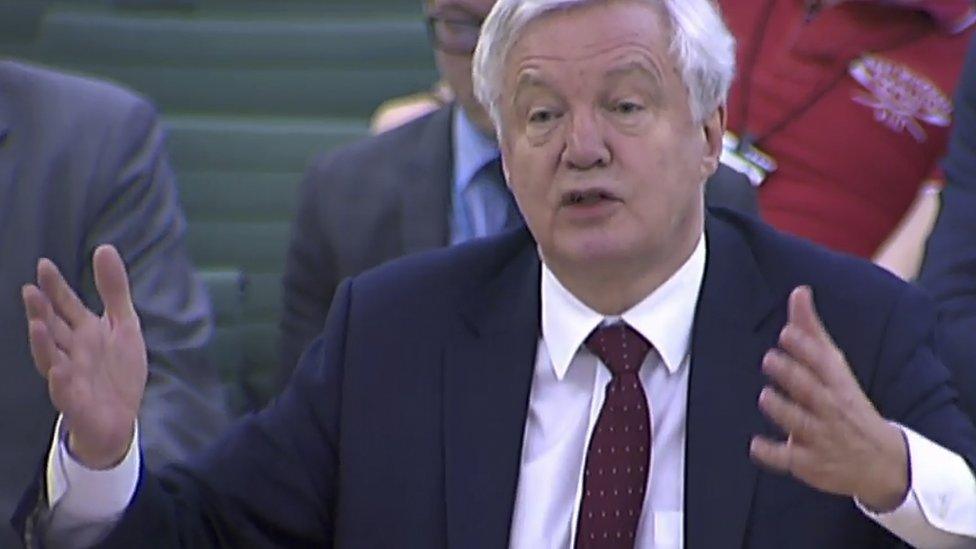
David Davis will be appearing before the Brexit select committee on Wednesday
It's back to Brexit again - with what promises to be two gruelling days of committee stage debate on the EU (Withdrawal) Bill, external.
As I describe below, the action around the bill's clauses on devolution may be overshadowed by the talks between UK and Scottish and Welsh ministers, and with the Irish Republic, but the proposal to ensure the Commons signs off on the payments for the ultimate divorce settlement could provide a test for the government whips, not least because some pro-Brexit MPs sound unhappy about the mooted amounts.
And the other bit of Brexit action to keep an eye on, is David Davis's appearance before the Brexit Committee, where he will need to defuse the row around the "Brexit Papers", the sectoral economic impact assessments prepared by his department.
The committee (or at least some of it) is on the warpath after it became clear that they had not been handed unedited documents.
It is, however, now pretty clear that the Brexit Committee is polarised between its Remain and Leave members - with some pro-Brexit members openly distancing themselves from its latest report on the Irish border issue.
This always seemed likely to happen at some stage, although the Chair, Hilary Benn, did an effective job in holding them together as long as he did. The trouble is that once committees start producing reports with a large minority dissenting, their authority is much undermined.
Offstage, keep an eye out for government amendments to the Data Protection Bill, external, enacting concessions agreed during the committee stage.....
Here's my rundown of the week ahead:
Monday
The Commons opens (2.30pm) with Communities and Local Government questions. Ministerial statements or urgent questions may follow at 3.30pm, but with a long night of legislating ahead of them, MPs won't be keen on anything frivolous...because next comes day 4 of committee stage debate on the European Union (Withdrawal) Bill, external.
This will focus on the clauses dealing with the devolution implications, and the result will be a rather odd piece of parliamentary shadow-boxing. The key concern is the fate of some EU powers on issues like the environment, agriculture and fisheries, many of which are already administered by the devolved governments. They want these (the Scottish Government has its eyes on 111 different powers) to be passed to them "without touching the sides", but that is not what Clause 11 of the bill, external says...and there is some nervousness and distrust about the UK government's intentions.
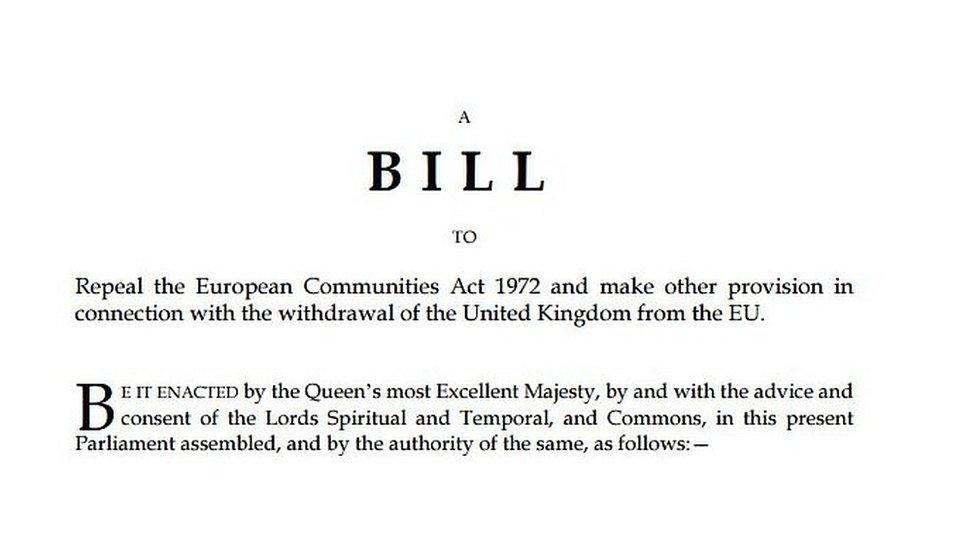
The real action on these issues is taking place in inter-governmental talks between Westminster ministers and the Holyrood and Cardiff Bay governments - Damian Green was visiting both this week (Stormont would, doubtless, be involved too, if the Northern Ireland Assembly was not stuck in limbo) and the bill will probably be tweaked at some point to reflect whatever deal is eventually agreed.
And, meanwhile, everyone is making fairly consensual noises and the SNP and Plaid have toned down their accusations of a Westminster "power grab", at least for the time being.
The point here is that the government does not want a situation where the bill did not receive the normal Legislative Consent Motion, external from the devolved parliaments. The lack of an LCM would not stop the bill, but it could encourage peers to press amendments to this part of it, when it reaches the House of Lords. The other point to watch is the position taken by Scottish Conservative MPs, who know they will be expected to deliver powers for Scotland...
On Northern Ireland, there's strong cross-party backing for New Clause 70 put by the Independent Unionist, Lady Hermon, to write the principles of the Belfast Agreement, which underpins devolution in Northern Ireland, into the bill.
And the bad news for parliamentarians and Parliament-watchers is that all the votes on different amendments will be taken as a job lot at the end of proceedings, which implies a rather late finish.
In Westminster Hall (4.30pm), there's a debate on e-petition 200032, external, "Pay Up Now! - Scrap the pay cap and give public servants a meaningful pay rise". This calls for the public sector pay cap to be scrapped, for the government to provide additional funding for public sector pay and for employers to put public sector workers pay up now. It was signed by 147,061 people.
In the Lords (2.30pm), questions to ministers cover child tooth decay, home battery storage, nursing and midwife numbers and identity cards, but the main event, from around 3pm is peers debating the economy in light of the Budget statement - the star speaker will probably be Alistair Darling, the former Chancellor.
Tuesday
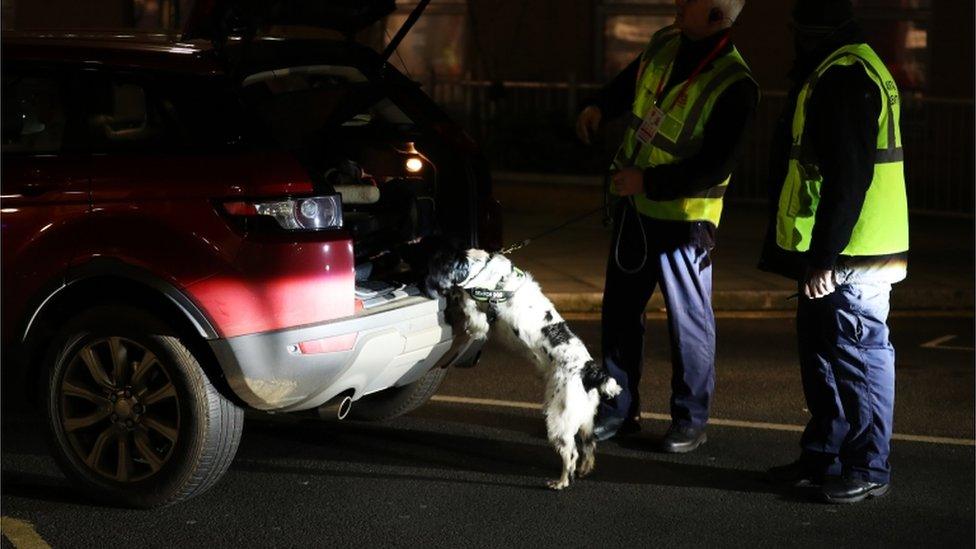
'Finn's Law' would make it an offence to attack animals like police dogs and horses
The Commons opens (11.30am) with Justice questions, followed (assuming no statements or urgent questions intrude) by a Ten Minute Rule Motion on offences against service animals from the Conservative, Sir Oliver Heald. The bill - dubbed "Finn's Law" - would make it an offence to attack service animals, like police dogs and horses, and could also cover guide dogs and assistance dogs. It was inspired by the case of police dog Finn, who lives in Sir Oliver's constituency, who was stabbed by a teenage boy while protecting his handler.
The main debate is on a Labour Opposition Day motion on universal credit - I have not seen the text yet, but the aim is doubtless to pile on the pressure on this issue, and perhaps force the Conservatives and DUP into voting on the issue.
In Westminster Hall, debates range across tolls on the Mersey crossings (9.30am-11am); the mineworkers' pension scheme (11am- 11.30am); Swansea's bid to be City of Culture 2021 (2.30pm-4pm) and fraudulent accounts in the banking sector (4pm-4.30pm).
The biggest debate is probably the one on World AIDS Day (4.30pm-5.30pm) - and its sponsor, Labour's Stephen Doughty says that, with one eye on the forthcoming Commonwealth Heads of Government Meeting, it will look at the Department for International Development's programmes to address HIV/AIDS and the status of LGBT communities.
And in the year which saw the first major decline in infection rates, there will also be discussion of how to maintain progress, especially in hard to reach parts of the LGBT community.
My committee pick is the Home Affairs hearing (9.30am) on policing and security cooperation arrangements after Brexit, which will cover such issues as UK membership of Europol, external and use of the European Arrest Warrant during a transitional or implementation period, data protection and data exchange on criminal matters with the EU after Brexit, and the UK's future relationship with the European Court of Justice.
But keep an eye on the Defence Committee hearing (3.20pm) on the future of the Royal Marines and UK amphibious capability, with a series of senior officers and experts. With Tory MPs including at least one committee member threatening rebellion over this issue, this will bear watching.
In the Lords (2.30 pm) question time covers rural poverty, the EU and proposals on the Irish border problem, and the planned naval programme and staffing. The peers will whiz through seven statutory instruments, which will be debated in two groups, with the whole process not expected more than an hour.
The first five relate to the Proceeds of Crime 2002 Act, followed by one on the Criminal Finances Act 2017 and one on the Terrorism Act 2000.
The main business of the day is a government debate on the Future of UK trade and customs policy in the light of the white papers Preparing for our future UK trade policy, external and Customs Bill: legislating for the UK's future customs, VAT and excise regimes, external.
Wednesday
The Commons opens (at 11.30am) with Scotland questions, after which comes Prime Minister's Questions.
The day's Ten Minute Rule Bill, from the Labour MP Ian Austin, is the Sanctions (Human Rights Abuse and Corruption) Bill - which is effectively a Magnitsky act for Britain, paralleling American legislation aimed at the people responsible for the death of Russian tax accountant Sergei Magnitsky in a Moscow prison in 2009.
New bill makes UK 'hostile' to kleptocrats
Formally the bill cannot be about an individual case, and will deal with sanctions for human rights abuses, but the word Magnitsky will crop up in every sentence. There is a similar Lords bill proposed by Labour's Baroness Kennedy - and the aim is to keep up pressure on government with strong cross-party backing.
Then it's back to the long march through the European Union (Withdrawal) Bill, where day five of committee stage will finish off the devolution section and then move on to money issues. This will entail a series of votes at the end of the devolution bit....then watch out for Labour MP Chris Leslie's New Clause 17, which will require Commons approval for the ultimate "divorce bill" with the EU.
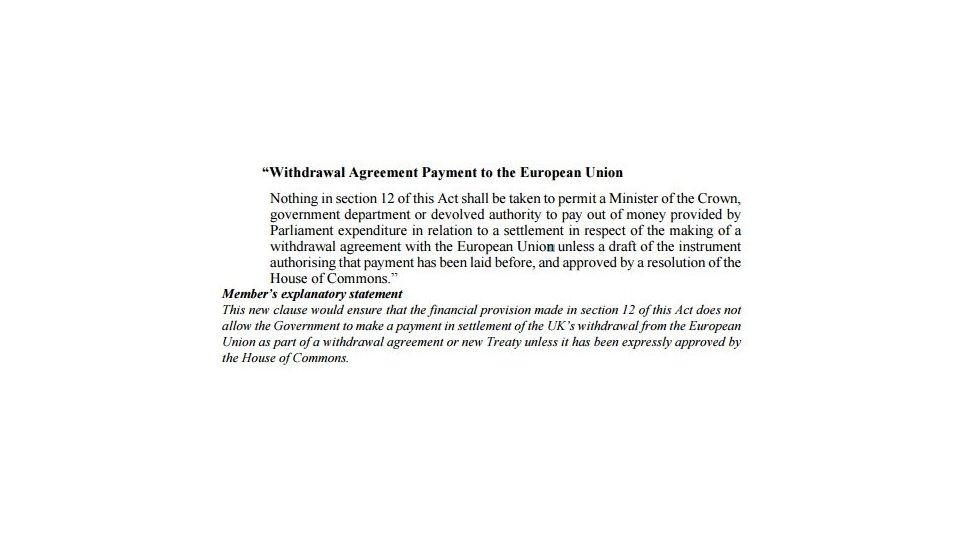
New Clause 17 requires a vote on the Brexit divorce bill
This could zero in on backbench Conservative disquiet at the size of the rumoured pay-off to Brussels, and could pose a serious problem for the government whips.
In Westminster Hall, the Conservative newcomer Gillian Keegan (obviously earmarked as a high-flyer, because she's been put on the prestigious Public Accounts Committee) leads a debate on youth employment (9.30am-11am), and in the afternoon Labour's Stephen Kinnock raises the effect of Israeli demolitions on Palestinian communities (2.30pm- 4 pm).
Next the Bermondsey MP Neil Coyle, whose constituency covers the sites of the London Bridge attacks, will raise government financial support for victims of terror attacks (4pm-4.30 pm). He says the Mayor of London has provided £175,000 to support victims, and Southwark council £106,000 but that the government has not contributed 1p. He will be pushing ministers to close a loophole that means only 'physical' damage is covered in the publicly funded terror insurance system and accuse ministers of ignoring the issue which they have known about for two years. And finally the Conservative former Defence Minister, Sir Mike Penning, has a debate on unduly lenient sentences (4.30pm- 5.30 pm).
My choice of the day's committee action is an easy one: Brexit Secretary David Davis is before the Exiting the European Union Committee, external (at 9.15am) to face the music over the "Brexit Papers" - with some prospect that a distinctly narked select committee may recommend he be investigated for contempt of Parliament.
In the Lords (3pm) questions range across government priorities on health policy in the Brexit negotiations, the impact on freedom of speech of the definition of hate crime, and mandatory electrical safety checks in the private rented sector.
Peers will then perform their final rites over the Telecommunications Infrastructure (Relief from Non-Domestic Rates) Bill, external - where the third reading debate should see the formalisation of a few government concessions.
The main legislating will be on the third committee day of debate on the Sanctions and Anti-Money Laundering Bill, external, where the key issues will be a public register of beneficial ownership of UK property by companies, and a new corporate offence of failing to prevent money laundering. Dinner break business is an regret motion from Labour's Lord McAvoy against a statutory instrument, the Social Security (Restrictions on Amounts for Children and Qualifying Young Persons) (Amendment) Regulations in Northern Ireland. But he is not expected to push this to a vote.
Thursday
The Commons opens (9.30am) with Environment, Food and Rural Affairs questions, followed (from 10.10am) by the monthly mini-question times for the MPs who speak on behalf of the Church Commissioners, the House of Commons Commission, the Public Accounts Commission and the Speaker's Committee on the Electoral Commission.
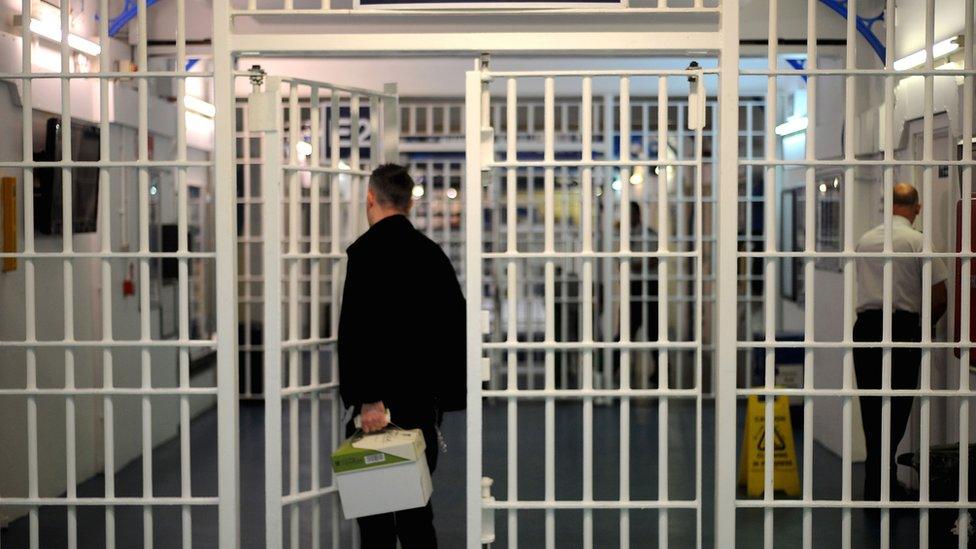
Then come two backbench debates - first the Justice Committee chair and former justice minister Bob Neill has a motion which "notes with concern the continuing crisis in prisons in England and Wales, with an historically high prison population and unacceptably high levels of violence, drug availability and use, disturbances and self-harm and self-inflicted deaths in the adult and youth custodial estate."
He will point to critical reports by his committee and HM Chief Inspector of Prisons which highlight the need for prison reform, and his motion also "regrets" that the government does not intend to bring forward reform legislation.
Then comes a general debate on the UK fishing industry - led by Cornwall Conservative, Sheryll Murray.
Continuing their tour of Brexit controversies this week, the Exiting the European Union Committee journey to Armagh, in Northern Ireland, to look at the issues around the Irish border.
In the Lords (11am) the subjects raised in questions to ministers include emergency housing for the unintentionally homeless, the new national minimum wage guidance on sleep-in shifts for care workers and the number of youth orchestras in the UK.
The comes a series of debates chosen by Conservative peers: first on ensuring regulation is balanced, cost-effective, easy to understand and properly enforced; second on the government's plans to improve the natural environment and animal welfare. The lunch-time mini-debate between these will be on the situation in Zimbabwe and the work that can be done internationally to facilitate its recovery.
The final business is a 90-minute short debate on the government's strategy against Islamist terrorism led by the former UKIP leader, Lord Pearson of Rannoch.
Friday
MPs are not sitting, but in the Lords (10am) it's the Archbishop of Canterbury's now-traditional December Friday debate - and this time, the chosen subject is the role of education in building a flourishing and skilled society.
The debate will focus on how our education system at all levels can help prepare society for the many challenges ahead, whilst retaining a values framework that keeps the common good at its centre.
Given that about a million children attend the 4,644 Church of England schools and 200 church schools in Wales, Archbishop Welby has some influence on these issues.
He also wants to highlight the importance of education in tackling deprivation and disadvantage, and the particular role the Church of England has to play in that process, given its educational clout.